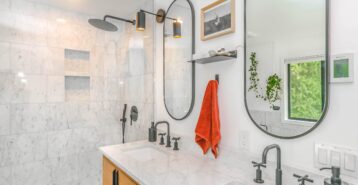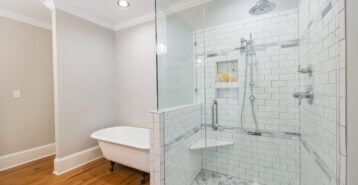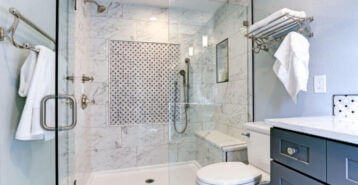Standard Shower Door Sizes: What to Know in 2026
Choosing the right size of shower door is more than a matter of preference; it’s a crucial aspect of bathroom design that affects both functionality and aesthetics. The right size ensures ease of access, maximizes space, and enhances the overall look of the bathroom. This article delves into the standard shower door sizes, offering insights into how to select the perfect fit for your bathroom.
Standard Widths of Shower Doors
Shower doors come in various standard widths, each serving different spatial and design needs. These standard shower door sizes cater to a range of bathroom layouts, from compact to spacious.
What Is the Standard Size for Shower Doors?
The standard size for shower doors is 22 to 36 inches wide by 72 inches in height. In this guide, we will walk you through common shower door widths that work for typical showers.
24-Inches
Homeowners often ask if a 24-inch shower door is too small. The answer depends on your bathroom and shower sizes.
A 24-inch shower door is compact and ideal for smaller bathrooms where space is a premium. These doors are typically used for narrow shower stalls and can be a smart choice for ensuite or guest bathrooms. However, their smaller size may not be suitable for all users, especially those who require more accessibility.
Pros
- Space-Efficient: Ideal for small bathrooms or tight spaces, maximizing the available area.
- Cost-Effective: Generally more affordable due to smaller size and less material usage.
- Minimalistic Design: Offers a sleek and compact look, fitting well in minimalist or modern bathroom designs.
Cons
- Limited Accessibility: Narrower opening can be challenging for individuals with mobility issues.
- Limited Space Inside: Can feel cramped, especially for larger individuals.
- Not Ideal for High Traffic: May not be suitable for bathrooms used frequently by multiple people.
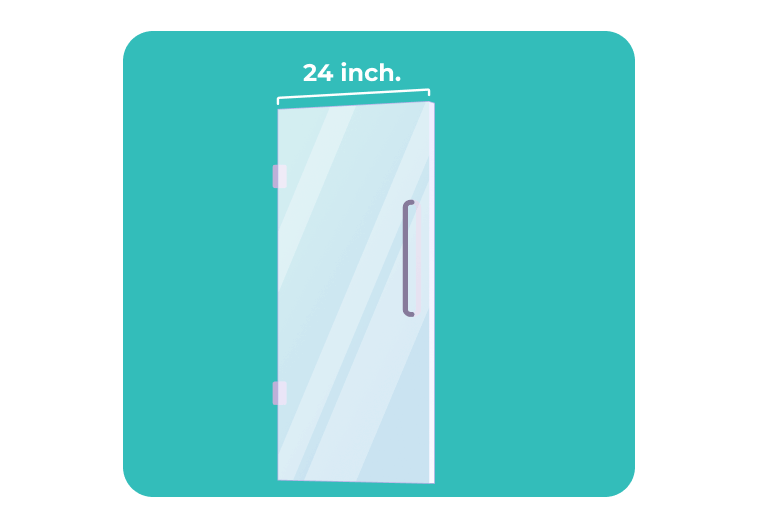
30-Inches
The 30-inch shower door size strikes a balance between space efficiency and accessibility. It’s versatile enough for different bathroom sizes and offers more comfort in entry and exit compared to its 24-inch counterpart. This size is a common choice, offering a blend of functionality and style.
Pros:
- Balanced Size: Offers a good compromise between space-saving and accessibility.
- Versatility: Suitable for a wide range of bathroom sizes and styles.
- Comfortable Access: Provides a more comfortable entry and exit than a 24-inch door.
Cons:
- Moderate Space Requirement: May still be too small for some users or luxury designs.
- Average Cost: Priced higher than smaller doors due to increased size.
- Standard Design: Might lack the uniqueness or luxury feel of larger doors.
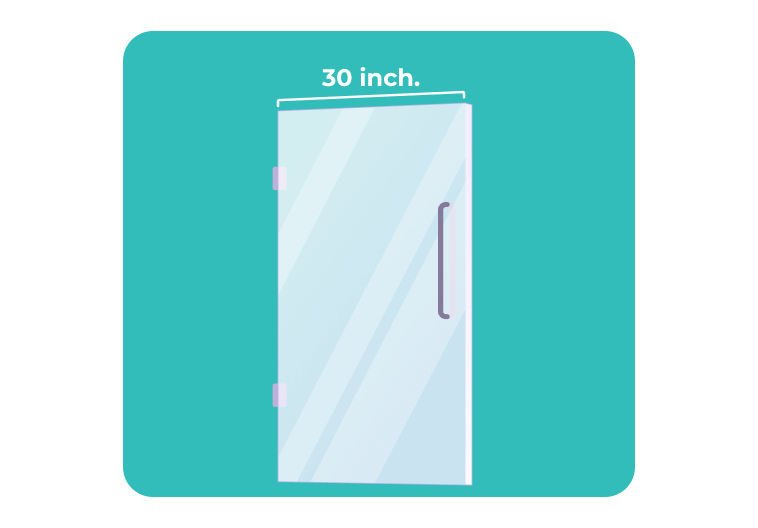
36-Inches
For medium to large bathrooms, a 36-inch shower door provides ample space for comfortable access while maintaining an elegant appearance. This size is well-suited for master bathrooms, offering a luxurious feel without overwhelming the space.
Pros:
- Spacious Access: Comfortable entry and exit, suitable for most users.
- Enhanced Aesthetics: Offers a more luxurious look compared to smaller doors.
- Universal Appeal: Fits well in most residential bathroom sizes and layouts.
Cons:
- Higher Cost: Generally more expensive due to larger size and material usage.
- Space Requirement: Requires more space, not ideal for very small bathrooms.
- Potential Overpowering Design: Can dominate smaller bathroom spaces if not well integrated into the design.
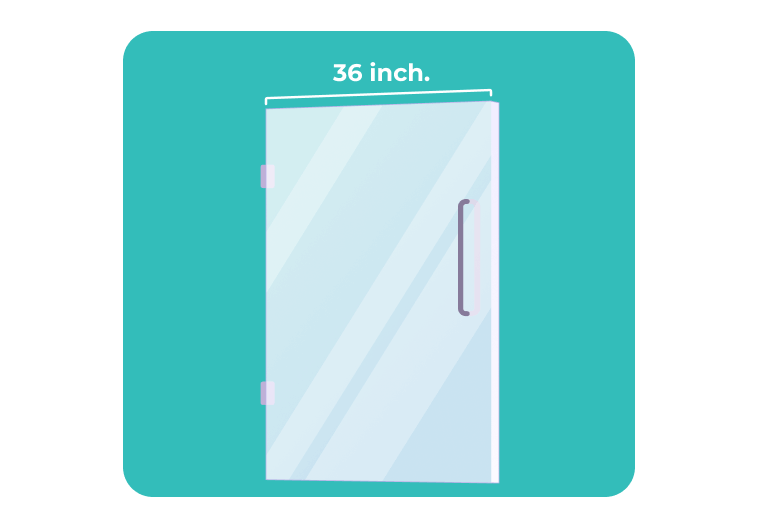
48-Inches
The 48-inch door is ideal for spacious bathroom layouts. It provides a wide entryway and often serves as a statement piece in the bathroom’s design. While offering maximum accessibility, it’s important to consider the bathroom’s overall size to ensure this larger door fits harmoniously within the space.
Pros:
- Maximum Accessibility: Wide opening, ideal for an inclusive design and ease of use.
- Luxurious Appeal: Often used as a statement piece in bathroom design.
- Comfortable and Roomy: Provides a spacious and open feel, enhancing the shower experience.
Cons:
- High Cost: Typically the most expensive due to size and luxury design elements.
- Significant Space Needed: Requires a large bathroom to accommodate the door size.
- Installation Considerations: May require more complex installation and stronger support due to weight and size.
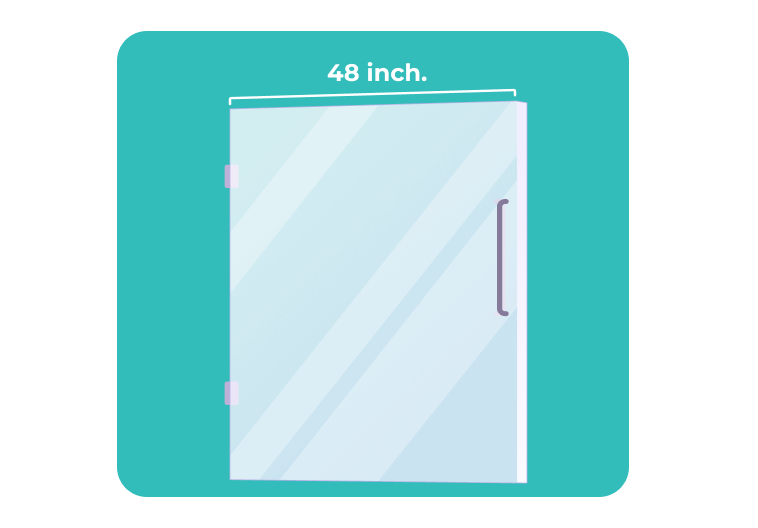
Shower Door Sizes by Door Type
Sliding (Bypass) Shower Doors
Sliding or bypass shower doors are popular for tub-shower combos and alcove showers. Standard sliding doors typically range from 48 to 60 inches wide and about 72 inches high. Each glass panel is usually 22 to 30 inches wide, overlapping on a track to save space. Sliding doors are ideal for narrow bathrooms where a swinging door would hit a vanity, toilet, or wall.
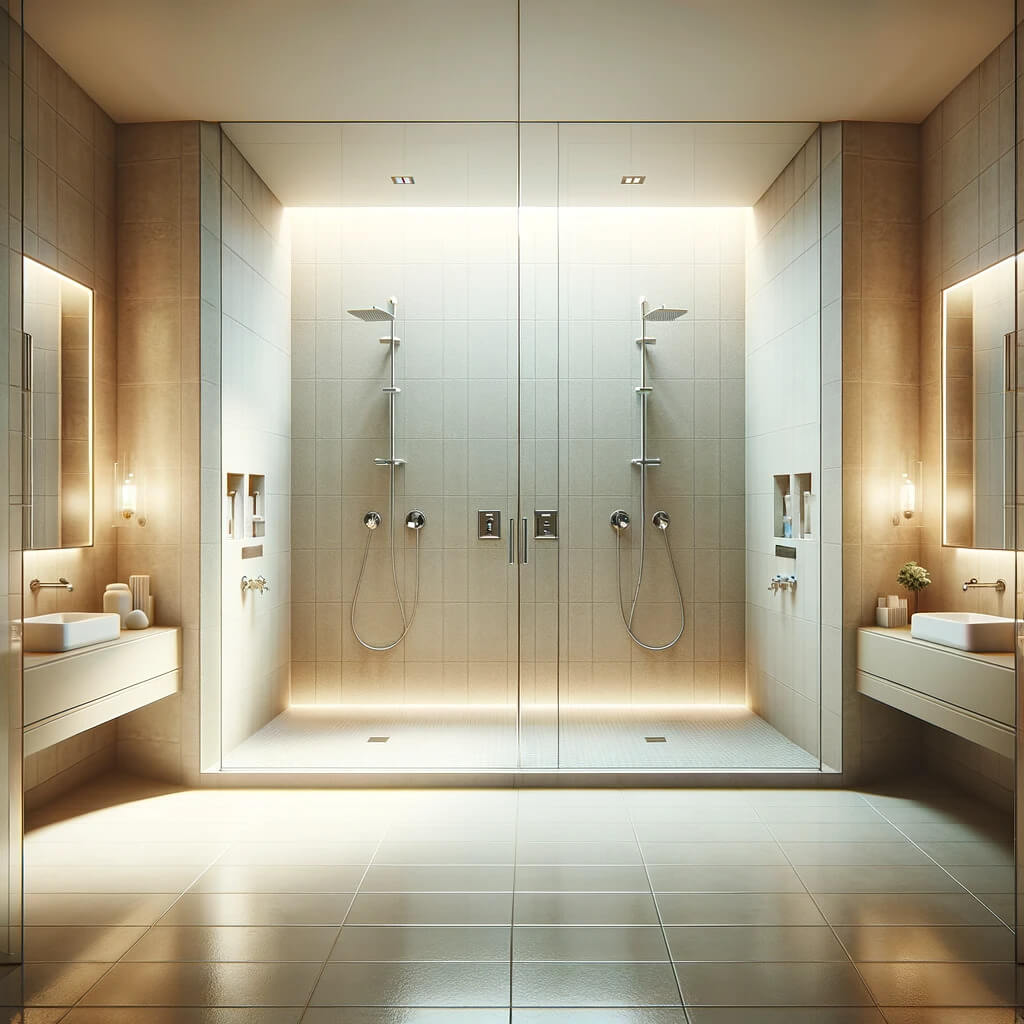
Pivot Shower Doors
Pivot shower doors swing on a pivot hinge at the top and bottom, allowing the door to open inward, outward, or both, depending on the hardware. Standard widths are usually 24 to 36 inches, with heights around 72 to 78 inches. Because the door swings out into the room, you’ll need enough floor clearance for the full swing radius, making pivot doors better suited to mid-sized and larger bathrooms.
Hinged Shower Doors
Hinged shower doors operate like a traditional door, with hinges mounted on the wall or a fixed glass panel. Common sizes range from 24 to 36 inches wide and 72 to 80 inches high. They offer a wide, comfortable opening and a clean look, but they do require clear space for the door to swing open. Hinged doors are often used on walk-in or frameless shower designs.
Neo-Angle Shower Doors
Neo-angle shower doors are designed for corner showers with a clipped or angled front. The door panel itself is often between 22 and 30 inches wide, with an overall enclosure width that typically ranges from 36 to 42 inches per side. These doors maximize floor space in small bathrooms by fitting neatly into a corner while still providing a comfortable entry.
Bi-Fold Shower Doors
Bi-fold shower doors fold in on themselves, making them a smart solution for tight bathrooms or narrow openings. Standard widths typically run from 24 to 36 inches, while heights are generally around 70 to 76 inches. Because they fold instead of swinging fully into the room, bi-fold doors help you get a wider entry in bathrooms where a hinged or pivot door will not work.
Fixed Panel (Walk-In) Shower Doors
Fixed panel doors (also called shower screens) are stationary glass panels that partially enclose a walk-in shower. Common widths range from 24 to 48 inches, with heights around 72 to 80 inches. They pair well with curbless and walk-in showers, creating an open, modern look while still keeping most water contained in the shower area.
Additional Considerations in Shower Door Sizes
Beyond size alone, there are a few additional things one must consider when choosing the right shower door size.
Minimum Width by Code
Legal and safety codes play a pivotal role in determining the minimum width for shower doors, primarily to ensure accessibility and safe use. For instance:
- Building Codes: Most local building codes specify a minimum width for shower doors, often around 22 inches. This is to ensure that in case of an emergency, the shower can be accessed or exited quickly and safely.
- ADA Compliance: For public or commercial buildings, and sometimes even in private residences aiming for inclusivity, adhering to the Americans with Disabilities Act (ADA) standards is crucial. ADA typically requires a minimum opening of 36 inches to accommodate users with mobility aids.
- Safety and Practicality: These minimum width requirements are not just legal formalities; they are crucial for practical and safe use. A door too narrow can pose risks, especially for children, the elderly, or those with disabilities.

Ensuring compliance with these codes not only promotes safety but also avoids potential legal issues or the need for costly modifications in the future.
Impact of Materials and Layout on Shower Door Size
The choice of materials and the overall bathroom layout are significant factors in deciding the size and style of a shower door.
Materials:
- Glass Thickness: Heavier, thicker glass may require sturdier hardware and framing, which can impact the size and style of the door. For example, frameless shower doors often use thicker glass for structural integrity.
- Frame Types: The type of frame (framed, semi-frameless, or frameless) affects the overall size and appearance. Frameless doors offer a more seamless look but might require additional space for hinges and proper operation.
Bathroom Layout:
- Space Constraints: The available space dictates the maximum size of the shower door. In smaller bathrooms, a sliding or bi-fold door might be more appropriate than a pivoting or hinged door that requires additional clearance.
- Fixture Interference: It’s essential to consider how the shower door will interact with other fixtures like toilets, sinks, and towel bars. There needs to be enough clearance for comfortable and safe use.
- Opening Direction: The direction in which the door opens (inward, outward, or sliding) is heavily influenced by the bathroom’s layout. Outward opening doors require more clearance space, whereas inward opening or sliding doors are better for tight spaces.
Understanding these aspects helps in making an informed decision that not only ensures the shower door is functional and aesthetically pleasing but also aligns with safety standards and bathroom dynamics.
How to Choose the Right Shower Door Size
Choosing the right shower door size is crucial for bathroom design. You’ll need to balance your family’s practical needs with aesthetic and style preferences. Don’t forget that accurate measurement and bathroom layout considerations are necessary in order to choose the right size.
While keeping budget and future needs in mind, your choice should go beyond basic practicality. The right shower door can also help create a bathroom that feels comfortable and personal. A thoughtful selection ensures your shower door enhances both functionality and overall design.
Compare top-rated bathroom remodel pros in your area.
Read real homeowner reviews, explore qualifications, and view promotions. Modernize makes it easy to browse professionals and find one that will be perfect for your project.






